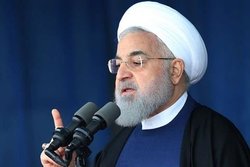 President Hassan Rouhani says the United States is at odds with Iran because of the Islamic Republic’s refusal to be submissive to America, as it used to be before the Islamic Revolution of 1979.
President Hassan Rouhani says the United States is at odds with Iran because of the Islamic Republic’s refusal to be submissive to America, as it used to be before the Islamic Revolution of 1979. RNA - “Today, we are again in a battle with the Iranian nation’s staunch enemy,” President Rouhani said during an address in the Lahijan City, in the northern Gilan Province on Wednesday, referring to the US.
“It (the battle) is all about one thing: America says we should go back to 40 years ago and we say we will not go backwards, we will continue on the path of progress, independence, freedom, and democracy,” the Iranian president said.
The Islamic Revolution in Iran deposed the then-Pahlavi regime, thus ending thousands of years of monarchical rule in the country. Mohammad Reza Pahlavi, the last monarch in Iran, was backed by America, which considered his regime its gendarme in the region.
Elsewhere in his remarks, President Rouhani said the status quo in Iran could not considered as normal.
“We are in a state of economic and psychological war,” he said, stressing that Iran was in fact facing the enemy at a “battleground.”
‘US was alone in quitting Iran deal’
Rouhani referred to the US’s unilateral withdrawal from a multilateral deal with Iran and said Washington had failed to get the other signatories on board to similarly abandon the deal, signifying a defeat for America.
“America was forced to singularly pull out of an international deal. It wasn’t a deal between Iran and America, it was one among seven countries; so, what happened was the US went against the United Nations, the international community, and all of the world’s countries,” President Rouhani said.
The Iranian chief executive said the US suffered yet another defeat when, at a United Nations Security Council meeting headed by US President Donald Trump last September, it faced strong defense of the Iran deal by all the other 14 Council member states.
“They backed the Iranian nation’s commitment and opposed the US’s non-commitment,” Rouhani said of the other members.
According to Press TV, Rouhani also pointed to the US’s failure at a meeting it had convened in the Polish capital of Warsaw last month, when it could not rally its allies around a purely anti-Iran agenda.
US Secretary of State Mike Pompeo had announced the meeting in January, saying it would purportedly focus on the “important element of making sure that Iran is not a destabilizing influence.” Later in the month, however, and as officials from various countries indicated their refusal to participate, US Deputy Ambassador to the United Nations Jonathan Cohen told the Security Council that the meeting was “not a venue to demonize or attack Iran,” in an apparent about-face.
“Therefore, the enemy has not achieved any success,” President Rouhani sad, “even though it has caused some problems for us.”
847/940